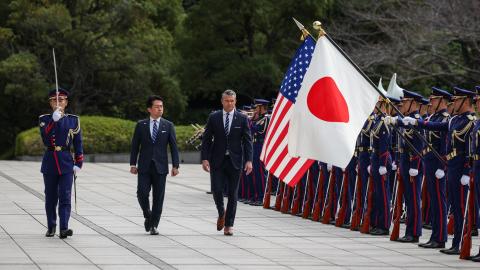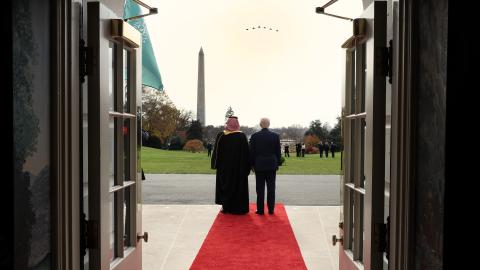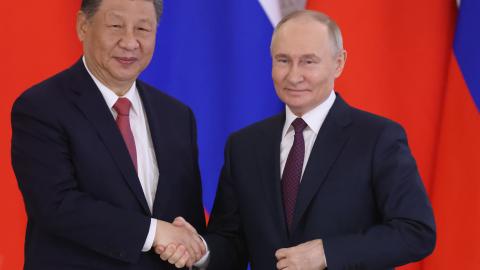While the world watches with alarm the deepening entente between Xi Jinping’s China and Vladimir Putin’s Russia, we would do well to recognize the limits and the inevitable failure of this axis of autocracy.
Far from being a formidable alliance of like-minded powers, the relationship is brittle and fraught with historical resentment, strategic contradiction and an unsustainable imbalance of power.
The “no limits” partnership is an illusion, an alliance of convenience masquerading as brotherhood. Strip away the joint communiques, military parades and diplomatic fanfare, and you find a hollow shell held together not by trust but by mutual exploitation.
Central Asia is ground zero for this strategic tug-of-war. Russia still regards the region as its imperial backyard, a legacy of czarist conquest and Soviet control.
Yet Beijing has surged past Moscow economically, embedding itself through the Belt and Road Initiative with roads, railways and debt. The Kremlin deploys troops and pushes the Collective Security Treaty Organization to maintain influence.
China builds factories and buys loyalty.
Russia wants political obedience.
The two goals are not compatible, and there is a real clash of ambitions. The former Soviet republics know this, and so do the Kremlin’s generals. This rivalry is not theoretical; it’s seriously realistic. Moscow wants to be the hegemon; Beijing wants to be the indispensable power. Both cannot be true.
Russia’s northern border, its “last redoubt,” is also under quiet siege.
Moscow claims the Arctic as sacrosanct, a fortress of frozen sovereignty. Yet China, with no Arctic border of its own, brazenly declares itself a “near-Arctic state” and seeks access to the region’s energy and shipping lanes.
Beijing’s Arctic ambitions are strategic, not opportunistic. Its plans are written into white papers and enshrined in its naval doctrine.
Russia’s nationalists see this for what it is: creeping encroachment under the guise of scientific cooperation. As Beijing melts the ice, it also melts Moscow’s delusions of sole control.
Their joint exercises and naval drills are carefully choreographed displays. Beneath the surface lies deep mistrust. Russia refuses to sell its most advanced weaponry to China. On rare occasions, cash-strapped Moscow has made sales to Beijing but typically counterbalances them by selling the same systems to China’s regional rivals, especially Vietnam and India.
In response, Beijing has stolen and reverse-engineered from Russia what it can, primarily and ironically, via Ukraine, which inherited a vast arsenal of Soviet-designed Russian weaponry. Since its independence in the 1990s, Ukraine has irresponsibly and recklessly sold much of this weaponry to China’s People’s Liberation Army.
These acquisitions included China’s first aircraft carrier, advanced engines for upgrading the PLA’s H-6 strategic bombers, Yun-series military transport aircraft, large air-cushioned amphibious landing craft and critical missile and fighter jet systems.
The PLA has replicated these technologies without credit or due compensation, an open secret that infuriates Russian defense officials.
This is not military integration; it is tolerated theft. Russia cannot afford to alienate its largest customer. China knows this and continues to push the limits.
China and Russia have fought more wars against each other than they have fought together. The border clashes along the Ussuri River in 1969 were not an aberration but a revelation. The Chinese Communist Party unwaveringly views the collapse of the Soviet Union as a result of Russian infidelity to true communism. Unlike the CCP’s ideological iron grip over the PLA, Mr. Putin’s abandonment of Leninist ideological control over armed forces, especially Russian mercenaries such as the Wagner Group, is idiotic and self-defeating.
In addition, the deep-seated distrust between these civilizations runs centuries deep. Treaties were signed with guns drawn, and empires were carved with knives at the throat.
Today’s leaders, Messrs. Xi and Putin, may toast each other in public, but they carry the burden of that history in private. Nationalist resentment lingers in both capitals.
Chinese ultranationalists call the 1858 Treaty of Aigun a national humiliation, one that ceded swaths of territory to Russia. Russian elites fear a slow-motion invasion by Chinese migrants and capital in Siberia and the Russian Far East.
This is not friendship. It is a staring contest between empires, paused for now by mutual hostility toward the United States.
Beijing sees Moscow less as a partner than a pawn. It is merely a useful distraction for the West, a supplier of cheap gas and a convenient guinea pig for authoritarian learning. When Mr. Putin is no longer useful, he will be discarded. That is the way of the Chinese Communist Party.
There is a reason Beijing hesitated initially to materially support Moscow en masse after the invasion of Ukraine. It doesn’t need a strong Russia; it needs a desperate one.
After Mr. Putin’s blunders on Ukraine’s battlefield became apparent, the CCP began to provide unconditional tools of war and other support for Russia’s aggression in Ukraine on a massive scale. This has made Mr. Putin beholden to Mr. Xi, whose economy is 10 times larger and whose diplomacy is far more agile and opportunistic.
Russia’s dependence on China grows daily in trade, in technology and in even the most basic banking functions.
Mr. Putin once dreamed of Russia as an Eurasian counterweight to the West. He now risks becoming a Chinese vassal. For a man obsessed with sovereignty, this is a profound humiliation.
Make no mistake: Beijing and Moscow share an enemy in the West, but they do not share a vision of victory. Russia seeks to reclaim lost imperial borders. China seeks to rewrite the rules of global governance.
Mr. Putin wants to break NATO; Mr. Xi wants to replace the liberal order with a CCP-centric system.
Where Russia acts out of insecurity, China acts out of ambition. Where Mr. Putin relies on brute force, Mr. Xi uses economic coercion, political infiltration and technological dominance.
These are not complementary strategies. They are contradictory road maps to different ends. Eventually, their paths will collide.
What binds Beijing and Moscow is not solidarity but shared resentment of Western liberalism, American primacy and democratic accountability. Resentment is not a strategy. It is a symptom.
The deeper truth is this: Messrs. Xi and Putin do not trust each other. In geopolitics, as in life, the absence of trust is fatal.
When the moment of reckoning comes, and it will, the dragon and the bear will turn on each other, just like Adolf Hitler’s Germany and Josef Stalin’s Soviet Union did nearly 85 years ago.
The West must be ready.

















